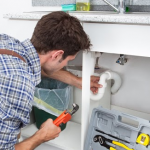Structural damage to a property can decrease the value of your property portfolio and affect the safety of your tenants. Keeping in control of property maintenance will help prevent property damage and protect your investment. Our latest blog shares information on how to identify issues which could lead to long-lasting structural property damage. Continue reading »
EPC – The Energy Efficiency (Private Rented Property) (England and Wales) Regulations 2015 are designed to tackle the least energy-efficient properties in England and Wales – those rated F or G on their Energy Performance Certificate (EPC). The Regulations establish a minimum standard for both domestic and non-domestic privately rented property, affecting new tenancies from 1 April 2018. This guidance relates to domestic property only. Corresponding guidance to landlords of non-domestic property can be found on the Government’s website www.gov.uk
WHY IS IT IMPORTANT TO CARRY OUT SPRING CLEANING?
Whether you are a relocation company providing services for expats or a landlord with multiple lets, your prime concern is keeping your properties occupied. With so much competition out there for tenants it’s more important than ever to make your property stand out from the rest. One certain way to achieve this is to employ the services of a professional cleaning company – we share our top tips in our blog below. Continue reading »
Is your property winter-proofed internally?
Now is the time to ensure that your properties are internally prepared for the winter weather. In last month’s blog, we covered exterior property maintenance. In this blog we’re discussing how to take care of the inside of your properties in order to avoid any unnecessary damage leading to costly repairs and perhaps resulting in dissatisfied tenants.
Are your properties cost efficient?
If you rent properties with bills included (e.g. halls of residence, temporary relocation properties or holiday lets) it’s in your best interest to keep heating costs down. Even if bills aren’t inclusive, reducing heating costs can still be to your benefit by keeping your tenants happy by saving on their heating bills. Your property will also benefit as it will reduce the chance of any unnecessary damp or damage caused by tenants scrimping on heating bills. So, how do you reduce heating costs? Simply follow these suggestions:
- Invest in decent insulation, especially in the loft – current guidelines in the UK recommend a minimum depth of 270mm and don’t forget to ensure pipework is lagged too (see below for further information).
- Loft Insulation can help lower your heating bills and helps reduce global warming and climate change.
- There are a number of grants and schemes available to home owners which can substantially reduce the cost of installing insulation.
- Bleed radiators to release trapped air and help them run more efficiently
- Provide draught excluders in furnished properties.
- Keep the boiler serviced (see further information below).
Are your pipes insulated?
We all know the costly devastation an undetected burst pipe can cause. Our unpredictable winter weather can cause rapid freezing and thawing which can lead directly to burst pipes. Apart from the expense of the wasted water, if your property is tenanted you may also have to bear the cost of finding alternative accommodation for your tenants until the property is habitable again. There are various ways to help avoid burst pipes.
- For insurance purposes, if you have vacant properties that you expect to be unoccupied for a prolonged period of time we always advise a full property drain down – your particular insurance may insist on this so check the small print.
- Alternatively, for properties that will only be unoccupied for short periods (such as student houses or holiday lets) you can fit heat-loss reducing insulation around exposed pipework.
- Remember, all pipework within the boundary of your home or business is your responsibility, so it really is worth protecting it properly to avoid serious problems during cold weather. Lag outside taps and pipework to prevent any external bursts. If left unnoticed this could result in a costly water bill if you’re on a meter. Water freezing over on the ground as the result of an external burst could also result in potentially dangerous accidents for your tenant or prospective purchasers/tenants when viewing vacant properties.
GMC offers a dedicated service to attend properties to carry out regular inspections and put the heating on when required in order to comply with insurance purposes. Some insurance policies require heating to be left working at a constant 15 degrees – we can organise this and also provide photographic evidence that the boiler is set correctly for your insurance records. Contact GMC for further information https://www.genmaint.co.uk/contact-us/
Are your appliances legal?
In accordance with the Gas Safety Regulations of 1998 all landlords are legally required to provide an annual Landlord Gas Safety Record, carried out by a registered Gas Safety engineer if their properties have any gas appliances (e.g. gas boiler, gas fire, gas cooker). If your property does not have mains gas and uses LPG Gas bottles, a landlord Gas Safety Record is still required. It is good practice to regularly service a gas fired boiler on an annual basis. By booking the annual service to be carried out at the same time as the landlord’s Gas Safety check, this provides a more cost- effective option. Not only will a well-maintained boiler run more efficiently, it will also prevent any unexpected boiler failures that could cause discomfort and inconvenience for your tenants. GMC has a network of contractors across the UK including OFTEC engineers for oil fired systems, and Gas Safe registered engineers for maintenance of both mains gas or LPG systems.
Here at GMC we’re committed to providing landlords and property management companies with the highest standard of property maintenance services. If you would like a quote for any of the services detailed in this blog please contact the GMC team at 01903 721020 or email info@genmaint.co.uk

With winter weather upon us it’s essential to ensure that your properties are prepared. In our previous blog we covered winter maintenance for your properties’ exterior. In this blog we’re discussing how to take care of the inside of your properties in order to avoid any unnecessary property damage.

 Welcome To The General Maintenance Company
Welcome To The General Maintenance Company



